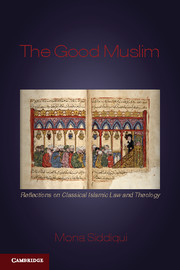Book contents
- Frontmatter
- Contents
- Acknowledgements
- Introduction
- 1 Spoken, Intended, and Problematic Divorce in Hanafī Fiqh
- 2 Between Person and Property: Slavery in Qudūrī’s Mukhtaṣar
- 3 Pig, Purity, and Permission in Mālikī Slaughter
- 4 Drinking and Drunkenness in Ibn Rushd
- 5 Islamic and Other Perspectives on Evil
- 6 The Language of Love in the Qur’ān
- 7 Virtue and Limits in the Ethics of Friendship
- Glossary
- Bibliography
- Index
1 - Spoken, Intended, and Problematic Divorce in Hanafī Fiqh
Published online by Cambridge University Press: 05 July 2012
- Frontmatter
- Contents
- Acknowledgements
- Introduction
- 1 Spoken, Intended, and Problematic Divorce in Hanafī Fiqh
- 2 Between Person and Property: Slavery in Qudūrī’s Mukhtaṣar
- 3 Pig, Purity, and Permission in Mālikī Slaughter
- 4 Drinking and Drunkenness in Ibn Rushd
- 5 Islamic and Other Perspectives on Evil
- 6 The Language of Love in the Qur’ān
- 7 Virtue and Limits in the Ethics of Friendship
- Glossary
- Bibliography
- Index
Summary
When I began my doctoral studies, many of my parents’ friends who were of Indian and Pakistani origin were intrigued by my subject of study. After all, the Fatāwā ‘Alamgīrī was an impressive body of work, familiar by reputation to some of them, and it seemed appropriate in their view for a young Muslim woman to be studying marriage laws. However, when I also mentioned the subject of divorce (ṭalāq) to them, there was a distinct sense of disapproval on their part. Clearly this was not an appropriate subject for study; studying marriage laws had a rationale, but what was the gain in studying divorce? For most of them, the sense of unease was tied to their cultural prejudices, the stigma around the very word divorce within the Islamic context. In studying divorce laws, was I thinking of divorce as an option in my own life? When I think back to those years, I cannot remember any of my parents’ friends or any of my own relatives being divorced. Divorce was like a taboo word; it was hardly mentioned, and when the word did occasionally come up, the atmosphere was solemn. It was as if respectable people neither divorced nor talked of divorce.
Yet, the Qur’ān does talk of marriage and divorce, and marriage and divorce laws touch upon some of the most significant aspects of human relationships. Indeed, in the Qur’ān many of the verses that refer to women refer to them largely within the context of marriage and divorce. The verb nakaḥa and its derivatives are the closest terms used to encapsulate marriage and the different purposes of marriage. Fundamentally the term nikāḥ implies a legal contract between a man and a woman, a social institution and the physical act of sexual intercourse. Marriage is referred to in various contexts in the Qur’ān and the Qur’ān orders men to marry ‘women of their choice’ (Q 4:3) as an option. The Qur’ān affirms human sexual needs and sees marriage as a desirable and permissible remedy for natural passions. There is a Qur’ānic verse that is explicit in urging restraint in circumstances, ‘Let those who cannot afford to marry keep themselves chaste until God enriches them from his bounty.’ A prophetic ḥadīth also emphasises the importance of marriage as a relationship for fulfilling sexual needs, ‘Whoever is able to marry should marry for that will help him lower his gaze and guard his private parts [from committing illict sexual intercourse].’
- Type
- Chapter
- Information
- The Good MuslimReflections on Classical Islamic Law and Theology, pp. 10 - 35Publisher: Cambridge University PressPrint publication year: 2012



